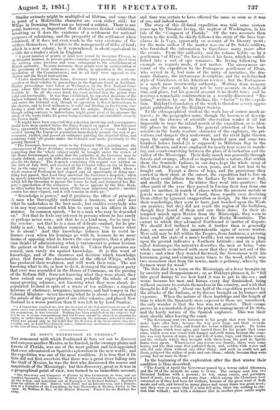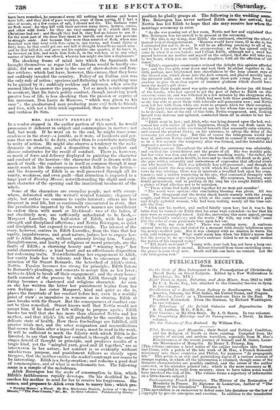DE SOTO'S EXPEDITION TO FLORIDA. * THE armament with which Ferdinand
de Soto set out to discover and conquer another Mexico, as he fancied, in the swampy plains and forests of Florida, was one of the most gallant and best-appointed that ever adventured on Spanish exploration in the new world; and the expedition was one of the most resultless. It is true that if De Soto did not first ascertain that there was a great river falling into the Gulf of Mexico, he was the first who discovered the course and magnitude of the Mississippi; but this discovery, great as it was in a geographical point of view, was turned to no immediate account,
• The Discovery and Conquest of Florida by Don Ferdinando de Soto, and six hundred Spaniards, his followers. Written by a Gentleman of Elves, employed in all the Action, and translated out of Portuguese by Richard Hakluyt. Reprinted from the edition of 1611. Edited, with Notes and an Introduction, and a Transla- tion of a Narrative of the Expedition, by Luis Hernandez de Biedma, Factor to the same. By William B. Rye, of the British Museum. Printed for the Hakluyt So- ciety.
and time was certain to have effected the same as soon as it was of use, and indeed sooner.
The story of this ill-fated expedition was told some sixteen years ago by Theodore Irving, the nephew of Washington, in Ms tale of the " Conquest of Florida." Of the two accounts then known to the world, he chiefly followed the story of the Inca Gar- ellasso de la Vega apparently on account of its literary merit ; for the main author of the matter was one of Be Seth's soldiers, who furnished the information to Garcilasso many years after the events. From this authority, and the volume before us by a gentleman "of Elvas," the Inca derived his facts, which he embel- lished into a sort of epic romance ; Mr. Irving following his example as regards mode, if not matter. The anonymous ac- count of the expedition by the Portuguese gentleman of Elvas, who served in it, had none of the unity of narrative, the dra- matic dialogue, the picturesque description, and the well-finished style of Garcilasso, or his American reviver ; but the Portuguese
is a much more trustworthy authority. 'Writing from memory long after the event, he may not be very accurate in details of
time and place, but his general account is no doubt true ; and he receives a remarkable confirmation in a recently-discovered "Re- lation," written by one Be Biedma, the " factor " to the expedi- tion. Hakluyt's translation of the work is therefore a very appro- priate publication for the Hakluyt Society. • To the ethnographical student the work has of course much in- terest; to the geographer some, though the looseness of descrip- tion and the absence of scientific observation render it all but impossible to trace the inland march of the expedition, or to iden- tify places by the names. The general attraction of the book consists in the hardy resolute character of the explorers, the pri- vations and dangers they underwent, and the vivid light thrown upon the opinion of the age. Six hundred men and some two hundred horses landed (it is supposed) in Hillsboro Bay in the Gulf of Mexico, and were employed for nearly four years in march- ing and countermarching between the place of debarkation and the
valley of the Mississippi. Their daily march was generally through forests and swamps, often of so impracticable a nature, that within them the Seminole Indians, in our days, kept the whole army of - the -United States at bay for seven years, and at last had to be bought out. Except a drove of hogs, and the provisions they
carried in their ships at the outset, the expedition had to live on what they could obtain from the Indians by fair means or foul, and mostly the latter. In winter they went into quarters : the other parts of the year they passed in forcing their way from one point to another, in search of places where the precious metals or jewels were reported to be found, those reports ever deceiving them either by ignorant exaggeration or design. In the course of their wanderings, they seem to have just touched upon the West- ern prairies; but they did not reach the region of the buffaloes,. though they heard of them and saw their skins. In their at- tempted march upon Mexico from the Mississippi, they seem to have caught sight of some spurs of the Rocky Mountains. The extent to which they advanced Northward is matter of dispute. We should feel inclined to rate it further than is generally done, on account of the unmistakeable signs of severe winter.
Mere cold may be felt within the Tropics, from dankness, a piercing wind, and the state of a man's health; but snow remaining long upon the ground indicates a Northern latitude ; and in a place called Antiamque the narrative describes the men as being "one whole moneth so inclosed with snow that they went not out of the towne ; and when they wanted firewood, the Governour with his horsemen, going and coming many times to the wood, which was two crossebow shot from the towne, made a pathway, whereby the footmen went for wood."
`De Soto died in a town on the Mississippi, of a fever brought on by anxiety and disappointment; or, as Hakluyt phrases it, he "fell into great dumps to see how hard it was to get to the sea ; and worse because his men and horses every day diminished, being without succour to sustain themselves in the country, and with that thought he fell sick." About one half of the expedition perished by the attacks of the Indians, or by disease brought on by hunger and exposure. When the nature of these hardships and the length of time to which the Spaniards were exposed to them are considered, the only wonder is that the loss was not greater. Their escape proves in a remarkable degree the prudent management of De Soto, and the hardy nature of the Spanish explorers. This was their state shortly after leaving the coast.
"The Governour sent two horsemen to his people that were behind, to make haste after him ; because the way grew long, and their victuals short. lice canine to Cale, and found the towne without people. He tooke three Indians which were spies, and tarried there for his people that came after, which were sore vexed with hunger and evil waies, because the cowl-
trie was very barren of maiz, low and full of water, bogs' and thicke woods; and the victuals which they brought with them from the port de Spirito Santo were spent. Wheresoever any towne was founde, there were some beetes, and hee that came first gathered them, and, sodden with water and salt, did eate them without any other thing : and such as could not get them, gathered the stalkes of maiz and eate them ; which, because therwere young, had no maiz in them."
In the beginning of the exploration after the first winter their condition is thus described.
"The fourth of Aprill the Governour passed by a towne called Altainace, and the 10 of the moneth he came to Ocute. The cacique sent him two thousand Indians with a present ; to wit, many conies, and partriges,.- bread of maiz, two hens, and many dogs : which among the Christians were esteemed as if they had been fat wethers, because of the great want of flesh meate and salt, and hereof in many places and many times was great need; ' and they were so searse, that if a man fell sicke, there was nothing to che- rish him withal; and with a sicknesse that in another place ensile might: have been rernedied,he consumed away till nothing hat &thane and bones were left; and they died of pure weaknes, some of them saying, If I had a slice of meate, or a few comes of salt, I should not die. The Indians want no fresh meat : for they kill with their arrowes many deere, hennes, conies, and other wild fowle : for they are very canning at it : which skill the Christians had not : and though they had it they had no-leisure to use it : for the most part of the time they apent in travail, and durst not presume to -straggle aside. And because they were thus wanted of flesh, when sue hundred men that went with Soto came to any towne, and found thirty or forty dogs, he that could get one and kill it thought himselfe no small man : and he that killed it, and gave not his eaptaine one quarter, if he knew it, he frowned on him, and made him feeie it, in the watches, or in any other =tam of labour that. was offered, wherein hoe might doe him a displeasure."
The shocking frame of mind, into which the Spaniards had brought themselves as regaried the Indians would be hardly cre- dible, did we not see it now in the case of slave-dealers and fron- tier settlers; which last have, however, this excuse, that they have not suddenly invaded the country. Policy of an Italian cast was the only rule of action : specious and flattering when anything was to be gained by it; suddenly reckless and inhuman when cruelty seemed likely to answer the purpose. Yet so much is rule superior to accident, that De Soto's politic conduct, though involving much greater loss of life, is less shocking than the passion or caprice of his successor, Don Louis de Museoso, "which was given to his ease "; the goodnatured man producing more evil both to friends and foes, with not a little trick superadded, than the more reserved
and ruthless De Soto.



























 Previous page
Previous page